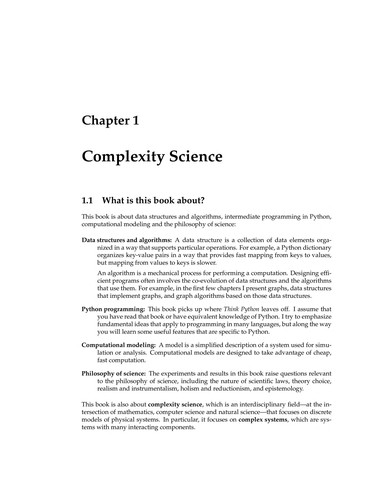Think complexity - Info and Reading Options
By Allen B. Downey

"Think complexity" was published by O'Reilly in 2012 - Beijing, it has 142 pages and the language of the book is English.
“Think complexity” Metadata:
- Title: Think complexity
- Author: Allen B. Downey
- Language: English
- Number of Pages: 142
- Publisher: O'Reilly
- Publish Date: 2012
- Publish Location: Beijing
“Think complexity” Subjects and Themes:
- Subjects: ➤ Computational complexity - Python (Computer program language) - Python (computer program language) - COMPUTERS - Programming Languages - Python
Edition Specifications:
- Pagination: xi, 142 p.
Edition Identifiers:
- The Open Library ID: OL27091975M - OL19542561W
- Online Computer Library Center (OCLC) ID: 768797408 - 801812142
- ISBN-13: 9781449314637
- ISBN-10: 1449314635
- All ISBNs: 1449314635 - 9781449314637
AI-generated Review of “Think complexity”:
"Think complexity" Description:
Open Data:
Complexity Science is an interdisciplinary field-at the intersection of mathematics, computer science, and natural science-that focuses on discrete models of physical and social systems. In particular, it focuses on complex systems, which are systems with many interacting components. Complex systems include networks and graphs, cellular automatons, agent-based models and swarms, fractals and self-organizing systems, chaotic systems and cybernetic systems. This book is primarily about complexity science, but studying complexity science gives you a chance to explore topics and ideas you might not encounter otherwise, practice programming in Python, and learn about data structures and algorithms. This book picks up where Think Python leaves off. I assume that you have read that book or have equivalent knowledge of Python. As always, I try to emphasize fundamental ideas that apply to programming in many languages, but along the way you will learn useful features that are specific to Python. The models and results in this book raise a number of questions relevant to the philosophy of science, including the nature of scientific laws, theory choice, realism and instrumentalism, holism and reductionism, and Bayesian epistemology
Read “Think complexity”:
Read “Think complexity” by choosing from the options below.
Search for “Think complexity” downloads:
Visit our Downloads Search page to see if downloads are available.
Find “Think complexity” in Libraries Near You:
Read or borrow “Think complexity” from your local library.
- The WorldCat Libraries Catalog: Find a copy of “Think complexity” at a library near you.
Buy “Think complexity” online:
Shop for “Think complexity” on popular online marketplaces.
- Ebay: New and used books.